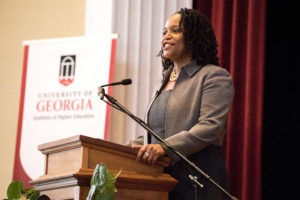Michelle Asha Cooper is a protector.
She protects students, she protects fairness, and she protects the right to higher education access regardless of the neighborhood people live in or how much money they make.

Cooper delivered the 2018 Louise McBee Lecture, sponsored by the Institute of Higher Education, Feb. 12 in the Chapel.
The lecture honors the vice president for academic affairs emerita of the University of Georgia whose leadership at the university spanned 25 years. Now in its 29th year, the McBee Lecture is one of the few annual lecture series in the U.S. that focuses solely on higher education.
Cooper believes that by reforming student financial aid policies, more students can have access to postsecondary education and be successful.
She is “one of the nation’s most effective voices in championing access to success,” said Erik Ness, associate professor and graduate coordinator at the Institute of Higher Education.
Cooper previously was the deputy director for the Advisory Committee on Student Financial Assistance at the U.S. Department of Education, where she advised Congress and the secretary of education on student financial aid policy issues. Today, she is president of the Institute for Higher Education Policy, an organization in Washington, D.C. It conducts research to improve national, state and local institutional policies by providing policymakers with nonpartisan, fact-based evidence about completion rates, student success in the workforce and how college access, affordability and completion vary by race, ethnicity and income.
“We need to be armed with better data to answer these very basic questions,” Cooper said. “Data that counts all outcomes and counts all students.”
IHEP plans to strengthen need-based financial aid and positive outcomes for students, increase degree completion and give incarcerated and formerly incarcerated students second chances at receiving an education.
“Significant numbers of our students today are adults, people of color and students from low-income and working-class backgrounds,” Cooper said. “The most effective policy proposals will promote college affordability, will drive college completion and will include often-forgotten populations such as the incarcerated.”
Cooper has worked on many college campuses, and helping students to break through financial barriers is a driving force in the work she does.
“College is a pathway out of poverty,” she said. “In this country, luck and ZIP codes should not be the determinants of access.”


